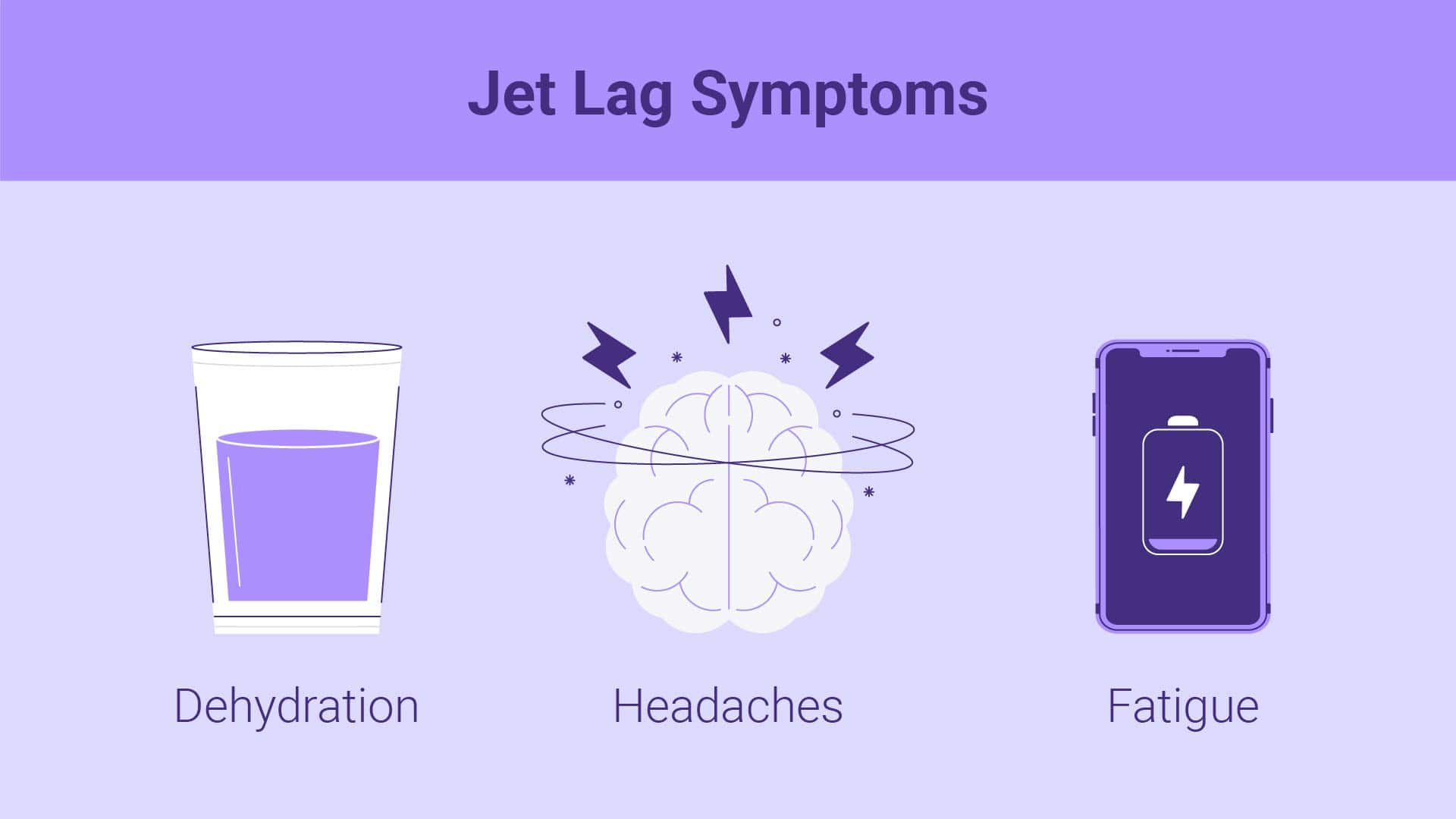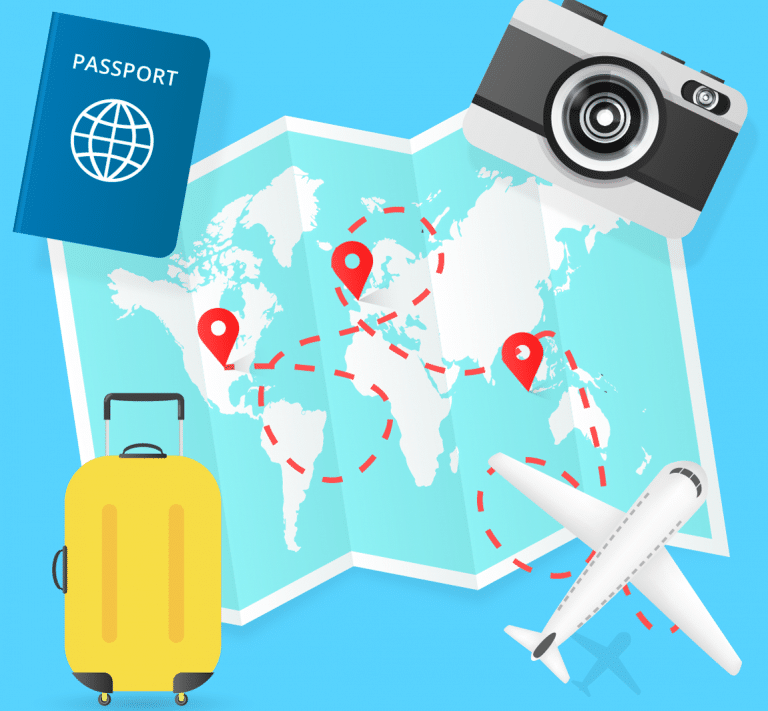5 Ways to Prevent Jet Lag
- Preparation is essential. Adjust your sleep schedule before traveling to align with your destination’s time zone.
- Regulate bright light exposure in the morning or evening, depending on your travel direction, to help your body adapt to the new time zone.
- Maintain proper hydration and consider your diet. Drink plenty of water, consume caffeine during the day, and choose appropriate foods to promote better sleep and alleviate the symptoms of jet lag.
Desynchronosis, otherwise known as jet lag, is a temporary sleep disorder. This disorder occurs when your circadian rhythm is thrown out of sync by traveling over a number of time zones. Our circadian rhythm, otherwise known as our biological clock, controls our sleep-wake cycle and other bodily functions. When your biological clock is not in sync with your time zone, jet lag occurs.
Jet lag is not a serious disorder but can cause daytime fatigue, difficulty concentrating, mood changes, restless sleep, gastrointestinal issues, and an overall “sick” feeling. When you’re traveling for vacation, these symptoms can throw your sleep schedule off and put a damper on the entire trip.
In this article, we’ll cover what jet lag is and how to avoid it.
1. Adjust your schedule before you depart
When traveling east, try to go to bed early and wake up early in the days leading up to your trip. If you’re flying west, try going to bed later and waking up later.
2. Sleep on the plane
Adjusting to your new time zone before you land can limit the effects of this sleep disorder. If you find it difficult to sleep on a plane, try using an eye mask and earplugs to block out outside disturbances.
3. Stick to your new schedule
Adjust your watch on the plane to represent local time of your destination. After you arrive, do your best to stick to a normal routine. Try not to fall asleep the first night until a reasonable time for that time zone, 10 p.m. is a safe bet. Avoid eating outside of normal meal times, too, as this will expedite the adjustment process.
4. Regulate bright light exposure
Natural light exposure is the most effective way to shift your sleeping patterns. When traveling westward, exposure to light in the evening before bed can help you sleep in later and put your body in sync with your new time zone.
On the other hand, when you’re traveling east and losing hours, exposure to light in the morning inhibits the production of melatonin and prompts you to wake up earlier. Practicing bright light exposure in the days leading up to your trip can prevent jet lag altogether.
5. Drink plenty of water
Staying hydrated can prevent or alleviate some of the symptoms associated with jet lag disorder, such as headaches, dizziness, and altitude sickness.
What Causes Jet Lag?
To understand what causes jet lag, you must first understand how your body’s biological clock works. Your biological clock regulates your biochemical, physiological, and behavioral body processes and helps maintain a normal sleep cycle.
The core component in regulating your sleep-wake cycle is the production of melatonin.
Melatonin is a sleep-inducing hormone influenced by the presence of light. When sunlight or artificial light enters our retinas, it transmits signals to our brain to inhibit the production of melatonin. When it gets dark, your brain senses the lack of sunlight and prepares your body to sleep. It does this by telling your pineal gland to produce melatonin.
When you travel over two or more time zones, the effects of jet lag are more apparent because the changes in time are more extreme than if you were going one time zone over.
For example, if you board a plane in Arizona and fly to Chicago, you’re traveling over one time zone, and your body only needs to adapt to the loss of one hour. Whereas if you board a plane in Arizona at 10 a.m. and take a 13 hour flight to Italy, when you land your brain will think it’s 11 p.m., but in Italy it will be 7 a.m.; this means you’re ready to go to bed while the rest of Italy is waking up for a new day.
The disconnect between your body’s circadian clock and the time of day can hinder vacation plans and business trips.
Traveling over multiple daylight-darkness cycles throws your suprachiasmatic nucleus out of sync. The suprachiasmatic nucleus is home to two separate but linked neuron groups, one controlling deep sleep and the other controlling REM sleep. When these processes are not in sync, it stops you from entering into a restorative sleep stage.
Jet Lag Symptoms
Traveling from long distances west to east increases the symptoms of this sleep disorder because you are losing hours instead of gaining them. When flying east to west, you’re “gaining time” which gives your body more time to adjust to the time zone change. Below, we list the most common symptoms associated with this disorder.
- Insomnia
- Disturbed sleep
- Dizziness
- Fatigue
- Irritability
- Accumulation of sleep debt
- Stress
- Headaches
- Dehydration
- Frequent flyers may be susceptible to altitude sickness if not properly rested

Who’s At Risk?
Frequent flyers, flight attendants, business travelers, and older adults have a higher risk of experiencing symptoms. Traveling over different time zones and flying west to east can worsen symptoms associated with jet lag.
Additionally, you’re more likely to experience jet lag and other sleep problems if you do shift work.

What are the Best Treatments for Jet Lag?
There is no treatment for jet lag; however, doctors will recommend melatonin and light therapy.
- Melatonin is a relatively popular sleep aid and can help you fall asleep when, according to your biological clock, you should not be resting. Utilizing melatonin and sleeping at a normal time for your time zone can help you adjust after your flight quicker than your body naturally would. However, we do not recommend utilizing melatonin supplements or other sleeping pills because they can have negative side effects. Instead, we suggest using other, all-natural methods such as light therapy or diet modification to prevent symptoms of jet lag.
- Light therapy can speed up the adjustment process when traveling to a new time zone. As explained above, when traveling west, exposure to light in the evening before bed can cause you to sleep in later in the morning, putting you on pace with the norms of your new time zone. If you’re traveling east, bright light exposure in the mornings and afternoons helps your body adjust to the natural daylight-darkness cycle of your destination.
- Diet is another factor that can help you adjust to your new time zone. If you’re feeling tired during the day, instead of taking an afternoon nap, we recommend drinking caffeine during the daylight hours so you can stay awake until it’s a normal time for sleep where you are located. Additionally, eating protein during the day can counteract sleepiness. On the other hand, eating whole grains or some of the other best foods for sleep before bed can promote drowsiness.
Combining light therapy with a modified diet can effectively eliminate symptoms of jet lag entirely.

Overview and Conclusion
Jet lag is a sleep disorder occurring when your circadian rhythm is not in sync with your new time zone. Though not serious, this sleep disorder can cause you to feel sick and drowsy, which is very inconvenient when you’re traveling for vacation or business.
To prevent symptoms of jet lag from ruining your trip, we recommend planning ahead of time by preparing your body’s circadian rhythms for the shift in time zones, practicing good sleep hygiene, and sticking to a regular schedule upon arriving at your destination.
As always we recommend keeping a sleep journal documenting how your body feels and your quality of sleep, even when you’re away from home. Journaling is an easy way to keep track of symptoms and can also help you determine which prevention techniques and treatments are most helpful in combating this sleep disorder.
